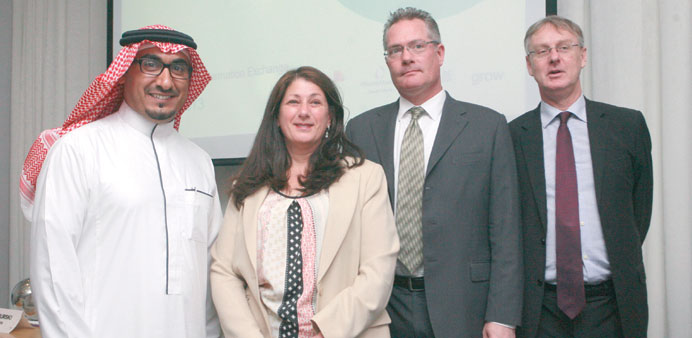From left: Dr al-Buhairan, Dr Feldman, Smith and Phillips pose for a picture at the roundtable yesterday. PICTURE: T K Nasser
By Noimot Olayiwola/Staff Reporter
The use of the Health Information Exchange (HIE) system needs to be encouraged in Qatar with the necessary legal provisions to ensure its sustainability, a leading expert in the field has said. HIE is a method of gathering, collating and disseminating healthcare information across the various stakeholders, both public and private.
HIE expert from the US, Dr Sue Feldman said it was important to see people use the HIE as a standard of care once it is in place.
Speaking to Gulf Times on the sidelines of a one-day roundtable titled ‘Doha e-Health Dialogues-The Communication Exchange’, she said: “People have to use the HIE in order to report public health information on public health surveillance and in order to exchange referrals. The value proportion really is in the usage of it and having useful information come from it.”
The event, co-hosted by Pinsent Masons, PricewaterhouseCoopers (PwC) and ictQATAR, was attended by leading stakeholders in the development and provision of e-health strategies and systems in the country.
Healthcare providers around the world are looking at ways of controlling healthcare costs, driving up quality and empowering patients. Many governments believe HIEs could play an important role in achieving the goals.
The speaker explained that there was a commitment on the part of Qatar’s government to establish a HIE in Qatar.
“It is clear that the government wants to build the HIE system for the country but there is the need to understand, once the scheme is built, how do we get people to use it because that is going to create a sustainability around it and one of the options is to legislatively mandate its use,” she explained.
Feldman, who shared with the audience her experience in implementing HIEs in the US, also called for putting in place some regulations around what kind of information can be exchanged (through the system), and under what circumstances and for what purposes.
She maintained that patients should be the centre of the HIE system as well as drive the process.
“There should be consumer engagement, like allowing patients to have a portal into their health information and I believe that is critical…I don’t think Qatar is there yet but they have to start moving somewhere. I think with the medical groups already in place in the country, that is the right way to start and they shouldn’t stop there,” she advised.
Feldman recommended that it was important to get the best and the brightest of e-health system manpower to Qatar because the expertise to deliver the HIE is not yet available here.
“Qatar has the fiscal means to bring the required expertise for the HIE here such as those that can bring certain level of expertise and be the continuum of advisers to execute the vision of the country in order to benefit the patients and the entire populace,” she noted.
According to her, the benefits of HIE is multi-level and multi-stakeholder and they are also different for each person affected by the system, be it government, healthcare providers as well as the patients.
According to Pinsent Masons QFC branch Legal director Roger Phillips, the roundtable, which was the second in the series being planned to help ensure a comprehensive e-Health strategy in Qatar, was very productive.
“We are now seeing increasing networking around the element of e-health programme among all the stakeholders and there is a big opportunity for Qatar to develop some of this into a leading proposition that will not only be important locally, but also internationally,” he said.
He said that effective and secure exchange of clinical information provides huge opportunities to improve the delivery of healthcare, sometimes with life- saving consequences.
PwC Qatar Health Industries leader Ryder Smith said: “Accelerating the development of an HIE is central to the National Health Strategy 2011-2016. The HIE will enable integration, and indeed, creation of knowledge to inform future discussion of quality, access, and cost goals.”
While mentioning that the session provided an enriching dialogue between experts from both private and public health industries in Qatar, PwC’s Dr Fadi al-Buhairan also stressed the need to put in place an enabling law as well as a working committee, which should be part of a governing body to be formulated by ictQATAR for the HIE to be successfully implemented.

